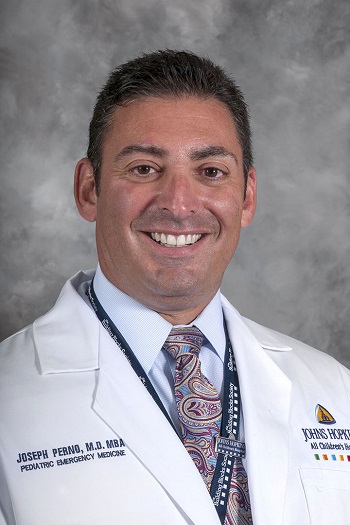Heart Health Is Important for Kids Too

Joe Perno, MD
Most of us think about cardiovascular or heart health as we get older, but it’s something that pediatricians follow from birth. Joe Perno, M.D., medical staff affairs officer at Johns Hopkins All Children’s Hospital, explains how pediatricians monitor heart health with children.
At each well visit, doctors monitor weight, diet and activity. As children continue to grow, they asses other risk factors for cardiovascular health such as family history of early heart disease (under 55 years old), high cholesterol and obesity. They also asses for environmental risk factors such as tobacco exposure. Teaching parents about the importance of limiting TV and sedentary time and encouraging active play is also very important. Johns Hopkins All Children’s is working with the American Heart Association to educate both families and community pediatricians about heart health.
Do children actually need cholesterol screening?
Absolutely, a Centers for Disease Control study in 2010 determined that 20 percent of American children and teens have abnormal lipid levels. Although we know that heart disease and stroke are rare in children, the process begins at a young age and progresses throughout life. The thought process is: If we can identify who is at risk early, behavior modification such as healthy diet and exercise can start immediately.
When should the pediatrician be doing the cholesterol testing?
Pediatricians should be asking questions about family history at each annual visit. Some children are considered high risk, such as those with a family history of high cholesterol (especially a parent) or they have a disease that makes them high risk. These high-risk patients should be screened before the age of 4 and, depending upon the level, possibly yearly after that.
All children should have a universal lipid screen that includes cholesterol and triglycerides done between the ages of 9-11. Further screening and treatment is determined by the level.
Do children need their blood pressure monitored?
Children should have yearly blood pressure screenings done starting at age 3. The blood pressure is then compared to tables for age, gender and height. If the child’s blood pressure is greater than the 90th percentile, the American Academy of Pediatrics has guidelines for treatment. A recent study found that 23 percent of youth with hypertension receive the diagnosis. It is important for pediatricians to check blood pressure and diagnose hypertension.
Although there are several reasons for children to have high blood pressure or hypertension, most children have hypertension secondary to obesity. The initial treatment strategy for children is weight management and activity education. Rarely do children require anti-hypertension medications.
Just like in adults, good cardiovascular health is dependent upon a healthy diet and plenty of exercise. If these habits are established at a young age it is easier to create lifelong habits.
This information was shared on WTVT-TV’s Doc on Call segment, which is aimed at helping parents learn more about children’s health issues. The segment airs each Monday morning on Good Day Tampa Bay.
Story Credit: https://www.hopkinsallchildrens.org/ach-news/general-news/heart-health-is-important-for-kids-too


